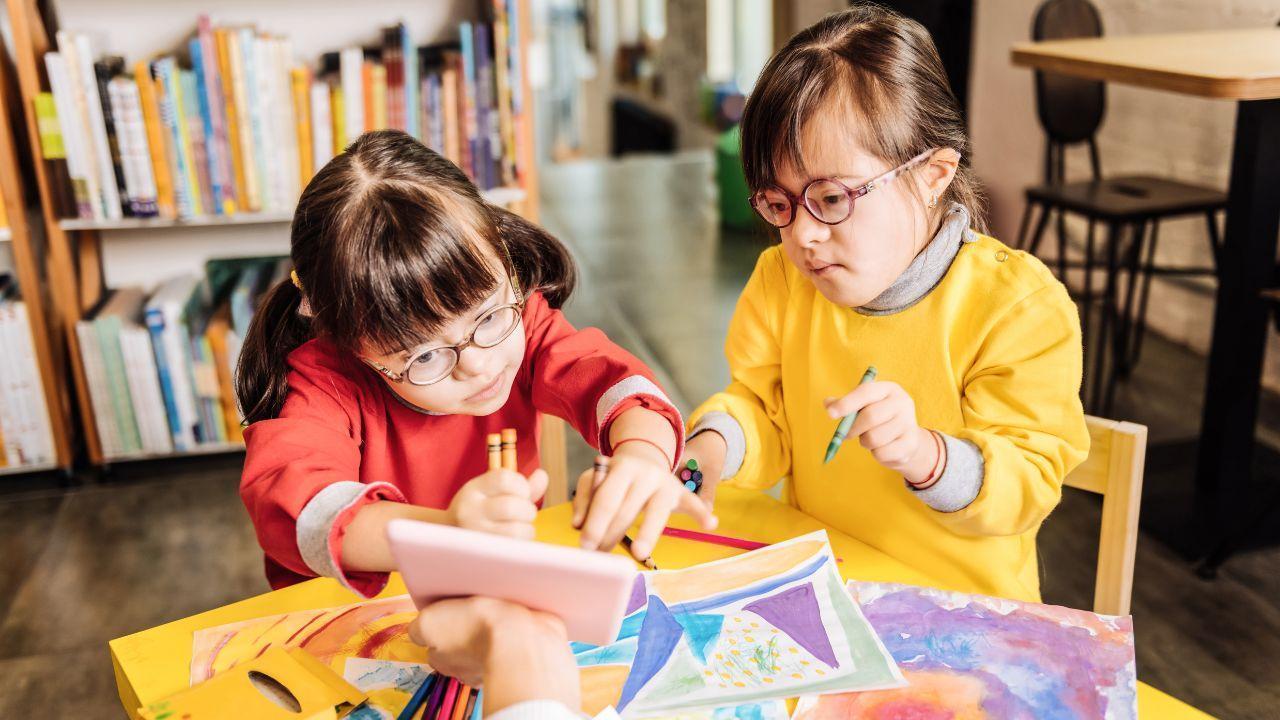
Post by : Zayd Kamal
In today’s diverse world, the need for Inclusive Education for Equal Opportunities is more pressing than ever. As education systems evolve, it is essential that they cater to all students, regardless of their abilities, backgrounds, or learning needs. Inclusive education ensures that every student, including those with disabilities, is not left behind but is provided the opportunity to succeed academically and socially. The principle of inclusion helps foster equality, break down barriers, and create environments where all learners feel valued and supported.
Inclusive education is the practice of educating all students together, regardless of their different abilities or challenges. The concept is built on the belief that every student, regardless of physical, cognitive, or emotional challenges, has the right to receive a quality education. Inclusive education for equal opportunities integrates students with disabilities or other special needs into general education classrooms rather than segregating them. This approach encourages diversity and promotes a culture of acceptance, ensuring that every student has the opportunity to participate fully in the educational process.
One of the primary benefits of inclusive education for equal opportunities is the promotion of equality and respect. In an inclusive classroom, students from all backgrounds—whether they have disabilities, come from different cultural backgrounds, or possess varying academic abilities—learn to appreciate and understand each other. This diversity enriches the learning environment and encourages students to build empathy, respect, and a deeper understanding of differences. By fostering these values early in life, inclusive education helps create a more tolerant and compassionate society.
Additionally, research shows that inclusive education benefits all students, not just those with disabilities. When students of different abilities work together, they learn valuable skills such as cooperation, teamwork, and problem-solving. The diverse learning environment pushes students to think critically and engage with different perspectives, improving their academic outcomes across the board. Moreover, students without disabilities often gain a better understanding of the challenges faced by their peers, which can enhance their social and emotional development.
The world outside of school is diverse, with people from all walks of life working together. Inclusive education helps prepare students for this reality by teaching them how to interact and collaborate with individuals who have different abilities, backgrounds, and experiences. By engaging in diverse learning experiences, students develop the interpersonal skills needed to work in a globalized, interconnected world. Inclusive education for equal opportunities promotes skills such as flexibility, adaptability, and problem-solving, all of which are crucial for navigating real-world situations, both in the workplace and in life.
This experience of working alongside diverse peers is invaluable in a modern society that increasingly values collaboration and inclusivity. By fostering an environment where every student can thrive, inclusive education not only benefits individual learners but also contributes to a more harmonious and inclusive society as a whole.
Another key benefit of inclusive education for equal opportunities is its ability to reduce social stigma and promote social integration. Traditionally, students with disabilities were often segregated into separate classrooms or schools, which could lead to feelings of isolation or discrimination. In an inclusive classroom, however, students with disabilities are integrated into the same environment as their peers, which helps break down stereotypes and encourages mutual understanding.
Students in inclusive classrooms are more likely to form friendships across different ability levels, which can lead to a more positive school experience for everyone. This social integration not only benefits students with disabilities but also helps students without disabilities develop greater empathy and a deeper understanding of differences. As a result, inclusive education helps foster a culture of kindness, acceptance, and respect, both within the classroom and the broader school community.
For inclusive education for equal opportunities to be successful, schools must implement several key strategies. First and foremost, educators must embrace differentiated instruction, a teaching method that tailors lessons to meet the diverse needs of all students. This approach allows teachers to offer various forms of content delivery, such as visual aids, hands-on activities, or digital resources, ensuring that all students can engage with the material in ways that work best for them. Differentiated instruction is essential for ensuring that every learner, regardless of their learning style or abilities, has access to the curriculum.
Moreover, schools must provide additional support services for students who need them. This may include the use of special education teachers, teaching assistants, or therapists who can work with students one-on-one or in small groups. Additionally, schools must ensure that their physical environments are accessible, providing ramps, specialized seating, and adaptive learning tools to accommodate all students. Ensuring that these resources are available helps create an environment where every student can participate fully in their education.
Teachers play a crucial role in the success of inclusive education, and for them to effectively support students with diverse needs, they must receive proper training. Professional development programs that focus on inclusive teaching strategies, classroom management, and special education best practices are essential for equipping teachers with the skills needed to thrive in inclusive settings. Ongoing training ensures that educators are up to date with the latest techniques and resources for supporting all learners, and it helps them build confidence in their ability to meet the needs of every student.
Furthermore, fostering a growth mindset in teachers is critical to creating an inclusive environment. Teachers should feel supported in their efforts to implement inclusive practices and be given the tools to adapt their teaching methods to accommodate the needs of all students. A supportive school culture that prioritizes inclusion and provides adequate resources can make all the difference in creating an effective and welcoming classroom.
Inclusive education for equal opportunities extends beyond the classroom and involves the active participation of parents, families, and communities. Parents must be engaged in the educational process, advocating for their children's needs and collaborating with teachers to ensure that their children have the resources and support they need to succeed. Schools that foster strong partnerships with parents and communities are better equipped to implement inclusive practices effectively and to create a welcoming environment for all students.
Community involvement is also essential for providing additional resources and support to schools. This can include funding for specialized programs, partnerships with local organizations, and the creation of inclusive extracurricular activities. When communities come together to support inclusive education, they help ensure that every student, regardless of their needs or background, has equal opportunities to learn and thrive.
While the benefits of inclusive education are clear, there are still significant challenges to its widespread implementation. These challenges include limited resources, inadequate teacher training, and resistance to change from some school staff or parents. However, these challenges are not insurmountable. Governments, schools, and communities must work together to address these barriers, whether through increased funding, policy changes, or awareness campaigns.
By investing in inclusive education and addressing the challenges that arise, we can create a more equitable and just educational system that serves the needs of all students. Inclusive education for equal opportunities is not just a theoretical ideal but a practical necessity that can transform lives and societies for the better.
Inclusive Education for Equal Opportunities ensures that all students, regardless of their abilities, backgrounds, or learning needs, receive equal access to education. This approach promotes equality, social integration, and the development of essential skills for life. Inclusive education encourages collaboration among students, reduces stigma, and prepares them for real-world challenges by teaching empathy, teamwork, and adaptability. By providing the necessary resources and support, schools can foster a welcoming and fair learning environment for everyone, leading to better academic and social outcomes for all students.
Disclaimer:This article is for informational purposes only and is provided by DXB News Network. The views expressed here are intended to foster understanding and awareness of inclusive education practices.
#trending #latest #InclusiveEducation #EqualOpportunities #InclusiveLearning #EducationForAll #SocialIntegration #DiversityInEducation #EmpathyInEducation #FairLearning #EducationalEquality #InclusiveSchools #breakingnews #worldnews #headlines #topstories #globalUpdate #dxbnewsnetwork #dxbnews #dxbdnn #dxbnewsnetworkdnn #bestnewschanneldubai #bestnewschannelUAE #bestnewschannelabudhabi #bestnewschannelajman #bestnewschannelofdubai #popularnewschanneldubai










Sheikh Mansour Arrives in Kuwait to Boost UAE-Kuwait Relations
Sheikh Mansour arrives in Kuwait for an official visit to meet the Emir, aiming to strengthen UAE-Ku

Story :The Merchant of Manchester - by Dr Amrinder Pal Singh
Story of loss, Kindness, Betrayal… and Legacy

Rashid Al Obad Appointed Director General of Shams
Sheikh Sultan issues Emiri Decree appointing Rashid Al Obad as Director General of Sharjah Media Cit

Dubai’s Government Best Practices Series 2025 Highlights Innovation
The Government Best Practices Series 2025 in Dubai focused on government innovation, digital service

Dubai Hosts GenAI Masterclass for Future Family Leaders
Dubai Centre for Family Businesses held a GenAI masterclass to train 24 young leaders in using AI fo

ArtDomain by DXB News Network Opens to Strong Global Response — Applications Begin for A50 and The Art Guild.
ArtDomain by DXB News Network Opens to Strong Global Response — Applications Begin for A50 and The A

Dembele's Goal Gives PSG a 1-0 Win Over Arsenal in Semi-final
Ousmane Dembele scores early to give PSG a 1-0 win over Arsenal in their Champions League semi-final